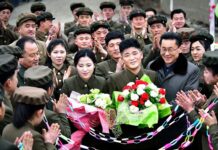Yesterday evening, following lengthy negotiations, North and South Korea agreed to hold working-level talks this Saturday morning at Panmunjom. The agenda for the meeting has one item on it: the future of the Kaesong Industrial Complex.
However, simply agreeing to hold talks does not guarantee that they will be productive, or even that they will bring the current inter-Korean war of words to an end.
It is unlikely that the decision to attend talks marks a sea change in North Korea’s attitude to the Kaesong issue, or to dialogue with Seoul more broadly. Whereas South Koreans often see Kaesong through the lens of inter-Korean cooperation, in the North Korean media it is usually described as an instance of North Korea “doing a favor” for the South by allowing it to operate the complex. As such, when South Korean conservative media outlets describe Kaesong as a “dollar box” for the North, it creates enmity, and that enmity is hard to dispel, particularly when the North Korean authorities are intent on fostering it.
Tomorrow’s meeting brings with it the possibility that North Korea is now prepared to discuss the demand that firms operating in Kaesong be allowed to export facilities, equipment and finished goods to South Korea. However, even if some degree of acceptance on that were achieved, it would still be a far cry from Pyongyang acquiescing to the demand that there be no repeat of the closure. The call for such a declaration is likely to be a major sticking point.
The losses incurred as a result of the current shutdown are already considerable, and this brings its own threats. 103 firms operating in the zone have now made claims against insurance made to protect them against losses, and even if the Kaesong Complex reopened on Sunday morning, there would be no guarantee that all firms nominally operating in it would survive.
Equally, it is impossible to be certain that North Korea doesn’t aim to structure the talks simply to incite so-called “South-South conflict” within South Korea, rather than to address outstanding issues.
During the Kim Jong Il era the military was the main thing emphasized in North Korean propaganda; conversely, under Kim Jong Eun it has been a mix of military and economic imperatives at the forefront. Arguably, at least for propaganda purposes, North Korea is a nuclear-armed state, and has been since the end of the Kim Jong Il period, meaning that it is the economic aspect that may define Kim Jong Eun’s reign. Of course, whether the pursuit of economic growth includes dealing with South Korea, especially under a conservative president, remains to be seen.

















